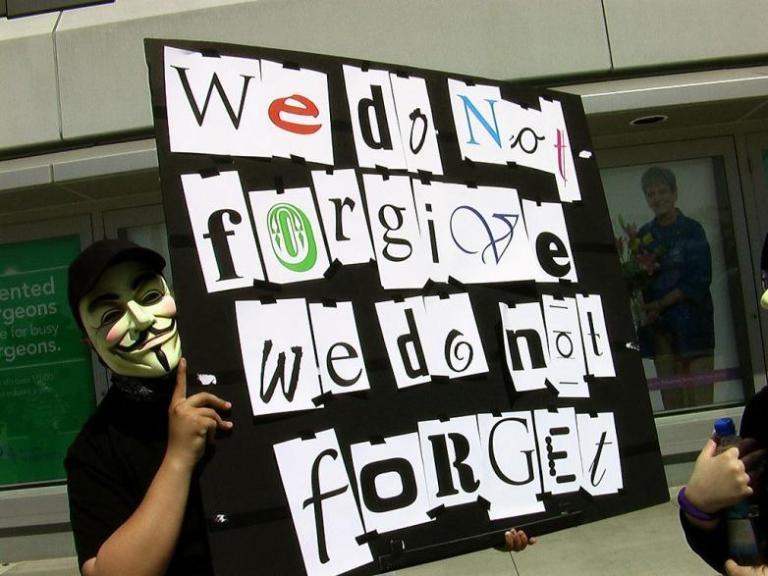The men caught in the sexual assault and harassment scandals are unlikely to find forgiveness in the world of public opinion. It doesn’t matter whether or not they have apologized, felt remorse, or publicly confessed their guilt and shame. If they take upon themselves some act of restitution or are punished for what they did, it won’t matter.
Even if somehow their victims forgive them, the perpetrators still will not find forgiveness from the public. And though they could find forgiveness from God, it may never occur to the perpetrators, as much as they yearn for forgiveness, that this is possible.
This is because there is currently no real concept for forgiveness in the secular world, no mechanism for atonement or redemption.
We see this also in marriages and other relationships. When there has been a hurt or a transgression, there is often little consideration of forgiving each other. Rather, the solution is to break the relationship, to never have anything to do with that person ever again.
My fellow Patheos blogger George Yancey has written a fascinating post entitled Why Have We Forgotten about Forgiveness? He cites an article that raises this issue, which blames social media. He points to research that finds that religious individuals have a higher capacity for forgiveness than the non-religious.
Yancey argues that the issue hinges on worldview. Christians know that they are sinners, as is everyone they will encounter. Christians know they need forgiveness and everyone else does too. Because of our fallen nature, Christians do not expect other people to behave perfectly. When they don’t, Christians can empathize with their failure.
Christians have a concept of atonement and redemption, which provides an objective foundation for forgiveness, both for themselves and others. This depends on the work of Christ, who bore our sins and the penalty they deserve, thereby justifying sinners.
Therefore, we can repent of our sins and receive God’s forgiveness. And because God forgives our trespasses, we can forgive those who trespass against us.
Secularists, though, have a different worldview. As Yancey explains it,
In a secular idea of human nature, there is no supernatural help. The only help we have is from ourselves. But that is okay since humans are the highest evolved beings that we have seen to this point in our history. So over time we have evolved in ways that enable us to grow not only physically but also morally and ethically. Thus, our society has challenged all sorts of oppressions and improved itself. This improvement is due to our evolving ability to reach towards societal perfection. From a secular perspective, perfection is not only reachable, but it is also desirable.
Because humans are responsible for achieving perfection, they have to be held accountable. Believing that perfectibility is achievable means that we are obligated to strive for perfection. Forgiveness may actually inhibit our achievement of perfectibility as it can be seen as providing individuals with a way out of their responsibly to achieve perfection. Someone exhibiting racism, sexism or some sort of other “ism” makes it that much harder for us to reach the ideal society into which we are evolving. Sanction and punishment of that person can set the example to discourage other transgressions. If we are perfectable, it makes sense not to forgive those who do wrong even if they regret their wrongdoing and made amends for it.
I have noticed that non-Christians today often confuse religion and morality and are willing to recognize Christ as our highest moral example, but they resist the notions of atonement, redemption, and forgiveness.
This may seem ironic because Christians are usually considered to be the moralistic ones. And yet actually the non-Christians may be far more moralistic, even as they reject Christian morality. In fact, it may be that their perfectionism requires them to reject Christian morality, since they can never live up to it. So they make it easier, adopting moral codes that they can fulfill, such as having the right political attitudes.
Instead of forgiveness, it seems to me, secularists have tolerance. They can have a high threshold of toleration for moral faults, though this varies from individual to individual. A person might respond to a particular kind of bad behavior by saying, “no problem” or “it doesn’t matter” or “that doesn’t bother me.”
But tolerating a fault is not the same thing as forgiving a fault.
Christians do not tolerate sexual immorality. But they show the sexually immoral where they can find forgiveness.
This may make the sexually immoral person angry, because to forgive implies that they have done something wrong that needs forgiveness! That flies in the face of their perfectionism.
They do not want forgiveness. They want acceptance and approval. They demand that Christians–and God–accept them as they are. They want Christians and the Christian’s God to say, you are good.
But Christians cannot say that of anyone, including themselves.
And yet when there arises a transgression, sexual or otherwise, that cannot be tolerated, the offender cannot be tolerated either.
At that point, any talk of forgiveness (ironically) sounds like toleration for the offense. It isn’t, though! Forgiveness comes at the high price of atonement and cannot be separated from revulsion against sin, whether in repentance or in mercy.
Photo, Protest by Anonymous, by Dogwearsglasses (Own work) [Public domain], via Wikimedia Commons













